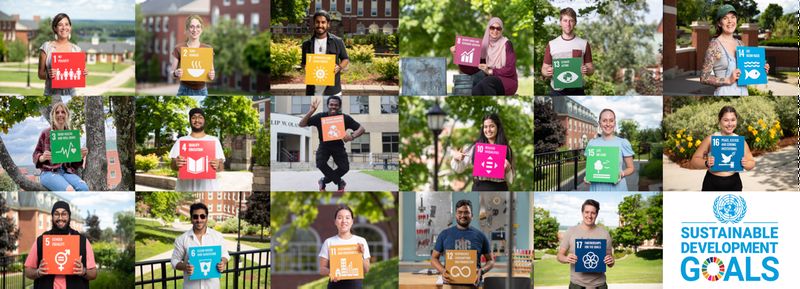What are the Sustainable Development Goals?
Author: UNB Sustainability
Posted on Oct 2, 2022

The Sustainable Development Goals (SDGs), adopted by the United Nations member states in 2015, consist of 17 goals that provide a shared blueprint for a more sustainable and equitable world. In addition, each goal has specific targets and indicators to help monitor progress towards achieving them.
The SDGs address the most pressing social, economic, and environmental challenges in developing and developed nations. Even though over 190 countries have adopted them, it is essential to note that they are not legally binding. Therefore, governments are expected to take ownership and establish suitable frameworks to help achieve the goals by 2030 (United Nations n.d). Since 2015, the Government of Canada has developed a national strategy to guide individuals and organizations on ways they can contribute to achieving the goals.

The SDGs at UNB
As part of the national strategy, post-secondary institutions were recognized to play an integral role since they prepare the future workforce. Hence, increasing awareness and engagement with the SDGs among universities and colleges will prepare students, faculty, and staff for current and emerging sustainability challenges. At UNB, we host an annual SDG poster campaign to highlight some of the work by different members of the community that contributes to each goal. Check out our posters in the Student Union Building and Saint John campus screens this month to learn how your peers, faculty and staff are working towards achieving the goals. In addition, each sustainability month event contributes to advancing at least one SDG.
How can you contribute to the SDGs?
The SDGs address issues that affect us, whether directly or indirectly. It may seem like they are too broad and complex to tackle as an individual and a student. However, there are several actions we can take to ensure a sustainable and equitable community around us. We can start by committing to the SDGs that address issues we are passionate about and then develop habits that advance these goals. Here are some examples:
SDG 4: Quality Education
Ensure inclusive and equitable quality education and promote lifelong learning opportunities for all.
- Volunteer to become a tutor in your program.
- Enroll in courses with experiential learning opportunities.
SDG 12: Responsible Consumption and Production
Ensure sustainable consumption and production patterns.
- Plan your shopping by using a list to ensure you do not overbuy.
- Plan your meals to avoid food waste.
- Shop and support local.
- Use reusable bags for shopping.
- Donate clothes, furniture, and other unwanted items in good condition.
SDG 13: Climate Action
Take urgent action to combat climate change and its impacts.
- Use energy wisely.
- Travel green.
- Eat more plant-based foods.
- Mobilize your community for local climate action.
- Stay informed on climate news.